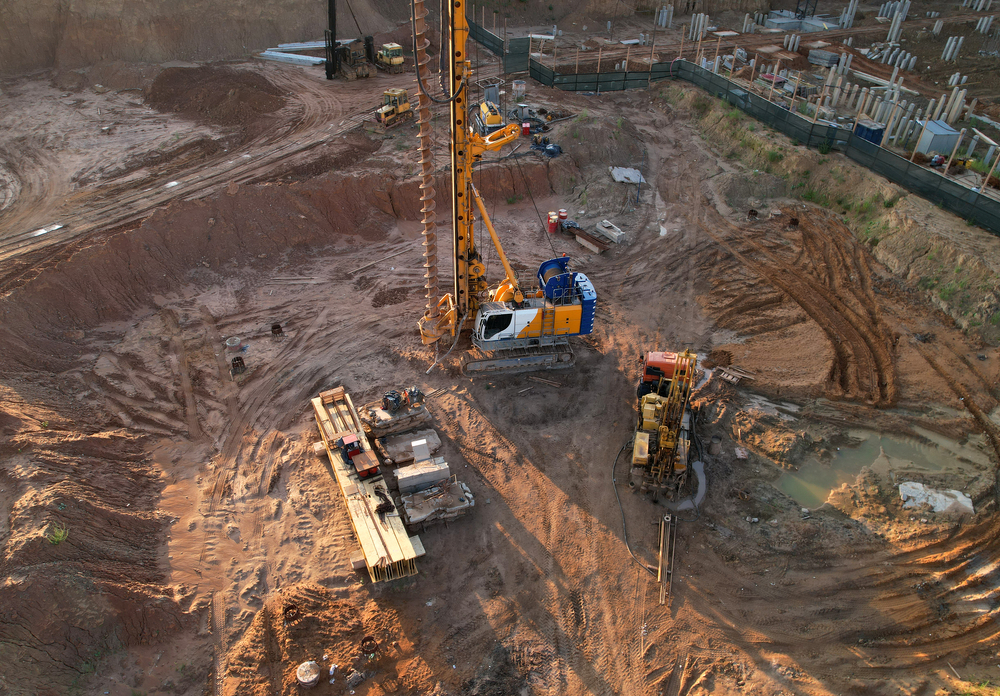The Main Principles Of Geotheta
The Main Principles Of Geotheta
Blog Article
All about Geotheta
Table of ContentsThe Single Strategy To Use For GeothetaMore About GeothetaThe Ultimate Guide To GeothetaHow Geotheta can Save You Time, Stress, and Money.Things about Geotheta

They perform site examinations, accumulate examples, carry out lab tests, and evaluate data to examine the suitability of the ground for construction jobs - Geo Tech Engineer. Based on their searchings for, geotechnical designers give recommendations for structure style, incline stability, preserving frameworks, and reduction of geotechnical dangers. They team up with various other experts, such as engineers, architectural engineers, and construction teams, to ensure that geotechnical considerations are incorporated into the total task layout and application
By evaluating the behavior and residential properties of soil and rock, they can recognize potential geotechnical dangers such as landslides, dirt negotiation, or incline instability. Their proficiency assists stop failings or mishaps that might endanger lives and home. Right here are some thorough responsibilities and responsibilities of a geotechnical engineer: Site Investigation: Geotechnical engineers conduct site examinations to gather data on subsurface problems.
They interpret the information to comprehend the residential or commercial properties and behavior of the soil and rock, including their toughness, permeability, compaction qualities, and groundwater conditions. Geotechnical Evaluation and Design: Geotechnical engineers analyze the data accumulated during site investigations to evaluate the stability and viability of the website for building and construction jobs. They carry out geotechnical computations and modeling to assess variables such as bearing capability, settlement, incline stability, side planet pressures, and groundwater circulation.
How Geotheta can Save You Time, Stress, and Money.
Foundation Design: Geotechnical designers play a critical function in making structures that can safely support the intended structure. They examine the soil problems and tons demands to figure out the suitable structure kind, such as shallow foundations (e.g., grounds), deep foundations (e.g (https://www.awwwards.com/geotheta/)., heaps), or specialized methods like soil enhancement. They think about aspects such as settlement limits, birthing ability, and soil-structure interaction to create optimal foundation styles
They review building plans, monitor website tasks, and carry out field examinations to verify that the design recommendations are adhered to. If unexpected geotechnical issues emerge, they evaluate the circumstance and give suggestions for remediation or adjustments to the layout. Danger Evaluation and Reduction: Geotechnical designers assess geotechnical hazards and dangers connected with the project website, such as landslides, liquefaction, or soil disintegration.

Partnership and Communication: Geotechnical designers work very closely with other specialists entailed in a project, such as architects, architectural designers, and building groups. Effective interaction and partnership are important to incorporate geotechnical factors to consider into the overall project layout and construction procedure. Geotechnical engineers provide technical know-how, response queries, and guarantee that geotechnical demands are fulfilled.
Geotheta for Beginners
Below are some kinds of geotechnical designers: Foundation Designer: Structure engineers specialize in making and evaluating structures for frameworks. They examine the dirt problems, lots needs, and site attributes to establish one of the most ideal structure kind and layout, such as shallow structures, deep structures, or specialized methods like pile structures.
They review the elements influencing incline stability, such as dirt residential or commercial properties, groundwater problems, and incline geometry, and establish strategies to stop incline failures and minimize risks. Earthquake Engineer: Quake designers concentrate on analyzing and creating frameworks to withstand seismic pressures. They assess the seismic threat of a website, assess dirt liquefaction possibility, and create seismic design standards to make sure the security and strength of structures throughout quakes.
They execute area screening, accumulate samples, and assess the gathered information to identify the soil homes, geologic formations, and groundwater conditions at a website. Geotechnical Instrumentation Designer: Geotechnical instrumentation engineers concentrate on monitoring and gauging the actions of soil, rock, and structures. They mount and preserve instrumentation systems that check factors such as dirt settlement, groundwater levels, slope movements, and architectural variations to assess efficiency and offer very early warnings of prospective issues.
10 Simple Techniques For Geotheta
They perform examinations such as triaxial tests, combination tests, direct shear examinations, and leaks in the structure tests to collect information for geotechnical analysis and style. Geosynthetics Designer: Geosynthetics designers focus on the style and application of geosynthetic products, such as geotextiles, geogrids, and geomembranes. They use these materials to improve dirt stability, reinforce slopes, supply water drainage services, and control erosion.
They have a tendency to be investigative individuals, which indicates they're intellectual, reflective, and analytical. They are curious, systematic, rational, analytical, and rational. Some of them are additionally social, suggesting they're kind, generous, participating, client, caring, useful, understanding, skillful, and pleasant - Consulting Engineer.
In the office atmosphere, geotechnical engineers use specialized software application devices to carry out calculations, develop styles, and evaluate data. They prepare reports, evaluation project requirements, connect with customers and staff member, and coordinate task activities. The workplace setting gives a helpful index atmosphere for research study, evaluation, and cooperation with various other professionals included in the job.
The 3-Minute Rule for Geotheta
They often visit project websites to perform site investigations, evaluate geotechnical problems, and collect data for evaluation. These gos to include traveling to different locations, often in remote or tough terrains. Geotechnical engineers may do soil sampling, conduct examinations, and screen building and construction tasks to make sure that the geotechnical elements of the task are being executed appropriately.
Geotechnical designers likewise function in specialized geotechnical labs. Geotechnical laboratory designers function thoroughly in these settings, managing testing devices, running tools, and tape-recording information.
Report this page